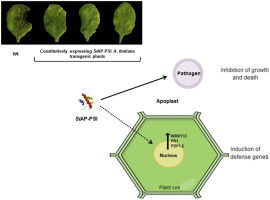当前位置:
X-MOL 学术
›
Phytochemistry
›
论文详情
Our official English website, www.x-mol.net, welcomes your
feedback! (Note: you will need to create a separate account there.)
Transgenic expression of plant-specific insert of potato aspartic proteases ( St AP-PSI) confers enhanced resistance to Botrytis cinerea in Arabidopsis thaliana
Phytochemistry ( IF 3.2 ) Pub Date : 2018-05-01 , DOI: 10.1016/j.phytochem.2018.02.004 María Eugenia Frey , Sebastián D'Ippolito , Alfonso Pepe , Gustavo Raúl Daleo , María Gabriela Guevara
Phytochemistry ( IF 3.2 ) Pub Date : 2018-05-01 , DOI: 10.1016/j.phytochem.2018.02.004 María Eugenia Frey , Sebastián D'Ippolito , Alfonso Pepe , Gustavo Raúl Daleo , María Gabriela Guevara

|
The plant-specific insert of Solanum tuberosum aspartic proteases (StAP-PSI) has high structural similarity with NK-lysin and granulysin, two saposin-like proteins (SAPLIPs) with antimicrobial activity. Recombinant StAP-PSI and some SAPLIPs show antimicrobial activity against pathogens that affect human and plants. In this work, we transformed Arabidopsis thaliana plants with StAP-PSI encoding sequence with its corresponding signal peptide under the control of the cauliflower mosaic virus (CaMV) 35S promoter. Results obtained show that StAP-PSI significantly enhances Arabidopsis resistance against Botrytis cinerea infection. StAP-PSI is secreted into the leaf apoplast and acts directly against pathogens; thereby complementing plant innate immune responses. Data obtained from real-time PCR assays show that the constitutive expression of StAP-PSI induces the expression of genes that regulate jasmonic acid signalling pathway, such as PDF1.2, in response to infection due to necrotrophic pathogens. On the other hand, according to the data described for other antimicrobial peptides, the presence of the StAP-PSI protein in the apoplast of A. thaliana leaves is responsible for the expression of salicylic acid-associated genes, such as PR-1, irrespective of infection with B. cinerea. These results indicate that the increased resistance demonstrated by A. thaliana plants that constitutively express StAP-PSI owing to B. cinerea infection compared to the wild-type plants is a consequence of two factors, i.e., the antifungal activity of StAP-PSI and the overexpression of A. thaliana defense genes induced by the constitutive expression of StAP-PSI. We suggest that the use of this protein would help in minimizing the ecological and health risks that arise from the use of pesticides. We suggest that the use of this protein would help in minimizing the ecological and health risks that arise from the spreading of resistance of agriculturally important pathogens.
中文翻译:

马铃薯天冬氨酸蛋白酶 (St AP-PSI) 植物特异性插入片段的转基因表达增强了拟南芥对灰葡萄孢的抗性
马铃薯天冬氨酸蛋白酶 (StAP-PSI) 的植物特异性插入片段与 NK-溶素和颗粒溶素这两种具有抗菌活性的皂苷样蛋白 (SAPLIP) 具有高度的结构相似性。重组 StAP-PSI 和一些 SAPLIP 对影响人类和植物的病原体显示出抗菌活性。在这项工作中,我们在花椰菜花叶病毒 (CaMV) 35S 启动子的控制下,用 StAP-PSI 编码序列及其相应的信号肽转化了拟南芥植物。获得的结果表明,StAP-PSI 显着增强了拟南芥对灰葡萄孢菌感染的抗性。StAP-PSI 分泌到叶质外体中,直接对抗病原体;从而补充植物先天免疫反应。从实时 PCR 检测中获得的数据表明,StAP-PSI 的组成型表达会诱导调节茉莉酸信号通路的基因表达,例如 PDF1.2,以响应由坏死性病原体引起的感染。另一方面,根据对其他抗菌肽描述的数据,拟南芥叶质外体中 StAP-PSI 蛋白的存在是造成水杨酸相关基因(如 PR-1)表达的原因,而不管感染 B. cinerea。这些结果表明,与野生型植物相比,由于 B. cinerea 感染而组成型表达 StAP-PSI 的拟南芥植物表现出的抗性增加是两个因素的结果,即 StAP-PSI 的抗真菌活性和A. 过度表达 由 StAP-PSI 的组成型表达诱导的拟南芥防御基因。我们建议使用这种蛋白质将有助于最大限度地减少因使用杀虫剂而产生的生态和健康风险。我们建议使用这种蛋白质将有助于最大限度地减少因农业重要病原体耐药性传播而引起的生态和健康风险。
更新日期:2018-05-01
中文翻译:

马铃薯天冬氨酸蛋白酶 (St AP-PSI) 植物特异性插入片段的转基因表达增强了拟南芥对灰葡萄孢的抗性
马铃薯天冬氨酸蛋白酶 (StAP-PSI) 的植物特异性插入片段与 NK-溶素和颗粒溶素这两种具有抗菌活性的皂苷样蛋白 (SAPLIP) 具有高度的结构相似性。重组 StAP-PSI 和一些 SAPLIP 对影响人类和植物的病原体显示出抗菌活性。在这项工作中,我们在花椰菜花叶病毒 (CaMV) 35S 启动子的控制下,用 StAP-PSI 编码序列及其相应的信号肽转化了拟南芥植物。获得的结果表明,StAP-PSI 显着增强了拟南芥对灰葡萄孢菌感染的抗性。StAP-PSI 分泌到叶质外体中,直接对抗病原体;从而补充植物先天免疫反应。从实时 PCR 检测中获得的数据表明,StAP-PSI 的组成型表达会诱导调节茉莉酸信号通路的基因表达,例如 PDF1.2,以响应由坏死性病原体引起的感染。另一方面,根据对其他抗菌肽描述的数据,拟南芥叶质外体中 StAP-PSI 蛋白的存在是造成水杨酸相关基因(如 PR-1)表达的原因,而不管感染 B. cinerea。这些结果表明,与野生型植物相比,由于 B. cinerea 感染而组成型表达 StAP-PSI 的拟南芥植物表现出的抗性增加是两个因素的结果,即 StAP-PSI 的抗真菌活性和A. 过度表达 由 StAP-PSI 的组成型表达诱导的拟南芥防御基因。我们建议使用这种蛋白质将有助于最大限度地减少因使用杀虫剂而产生的生态和健康风险。我们建议使用这种蛋白质将有助于最大限度地减少因农业重要病原体耐药性传播而引起的生态和健康风险。











































 京公网安备 11010802027423号
京公网安备 11010802027423号